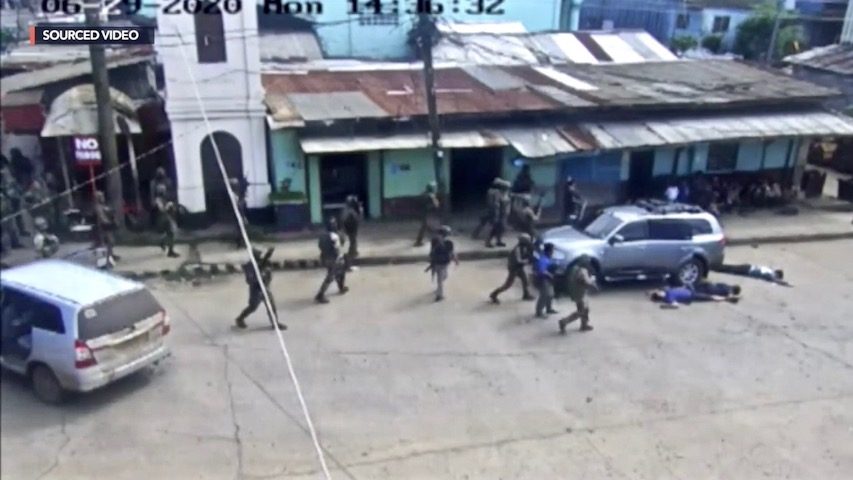SUMMARY
This is AI generated summarization, which may have errors. For context, always refer to the full article.
This compilation was migrated from our archives
Visit the archived version to read the full article.
It would have looked like just another day for the police under this government: their victims lying in cold blood on the street, one of them falling on his stomach with raised hands – as if in surrender. Except that they were no ordinary victims and they were shot dead in no ordinary street.
The June 29 broad daylight rubout in Jolo – in the Army’s words – characterizes in so many ways the last 4 years of Rodrigo Duterte’s presidency, which began on June 30, 2016. His first marching order the day after he took his oath of office was addressed to the Philippine National Police (PNP): “Do your duty and if in the process you kill 1,000 persons because you were doing your duty, I will protect you,” he told police officers gathered at Camp Crame on July 1, 2016.
The absolute power of a police force that takes no prisoners – even their better-equipped and more formidable brothers in arms.
The neglect of the real security threat – terrorism, especially in Sulu – in lieu of the easy and convenient enemy called the New People’s Army.
Rules of engagement made meaningless by presidential shoot-to-kill orders.
Reward redefined as something that’s given for bad behavior.

Former armed forces chief Ricardo Visaya raged and ranted on Facebook, calling out the PNP for tolerating its abusive men.
It must be hard to see this done in your own backyard, right? Because for years the guns were aimed at the unarmed and those so far out of the power corridors as to even squeak. (Recommended read: 4 years on, climate of fear and impunity blocks justice for Duterte’s drug war victims)
Mamasapano and Magalong
There was a time the PNP stood for what is right, even if it meant hurting their president.
In March 2015, then police director Benjamin Magalong submitted to then president Benigno Aquino III the report of a fact-finding committee that probed the police-led Mamasapano operation that ended up killing 44 members of the PNP’s Special Action Force (SAF).
The PNP under Aquino was not spared the presidential whim, an affliction that visits leaders who think the police can – and should be – at their beck and call. Without telling the military and even the superiors of the PNP, he approved a clandestine SAF operation against a top international terrorist holed out in a fortified stronghold in Maguindanao, leaving them like lambs to the slaughter.
Magalong led the probe into the fiasco, and concluded that Aquino bypassed the chain of command.
There was a time a police general not only braved presidential ire, he was also given the time to explain himself by his president. So that whatever Aquino’s fatal mistakes in that operation, I long to see that moment again: on March 17, 2015, Aquino and Magalong met in Malacañang to discuss the damning report against the president then. “He was visibly hurt,” Magalong would tell reporters later about the meeting. But the discussion remained cordial, orderly, straightforward.
Today, the public continues to benefit from professionals like Magalong.
As mayor of Baguio City, he has applied his operational skills and vast experience to stem the coronavirus tide against his constituents.
It is no coincidence that as we marked Duterte’s 4th year in office, we featured this retired police general who is showing everyone how the nation can benefit from policemen who do good.
Must remember
What have we learned in the last 4 Duterte years?
One, that we can do it on our own, as Valenzuela Mayor Rex Gatchalian realized during the pandemic. Read about his fight here.
Second, that despite the misogyny emanating from the Palace, women mayors continue to make a difference. Read the stories of Mayor Trina Firmalo-Fabic of Odiongan, Romblon, and Mayor Krisel Lagman-Luistro of Tabaco, Albay.
Third, that bang-bang leadership freezes in the face of a complex and agile enemy. Read about how Dutert’s promise of decisive leadership unravelled during the pandemic.
Fourth, that hubris and impunity have far-reaching consequences even on institutions that we all thought would be too big and too popular to break: ABS-CBN. While lawmakers were grilling its executives about its expired franchise on June 30, the ABS-CBN family was slapped with back-to-back shutdown orders of its two other channels.
Fifth, that the resilience of the economy is built over the years under many presidents – and every good or bad decision made is put to a test on the global stage.
Two more years
Assuming elections push through in 2022 (you’ll never know in the current world order), we are now entering the last two years of President Duterte.
If there’s anything we’re certain of, it is that it will continue to be hell for his critics and independent voices.
And that the armed institutions he has empowered and emboldened will continue to wreak havoc on our civilian lives. (Recommended read: The Philippine military and its hypocrisy)
Did I depress you today? We need company; we’ve been depressed for years. Send me your thoughts at glenda.gloria@rappler.com. – Rappler.com
Add a comment
How does this make you feel?
There are no comments yet. Add your comment to start the conversation.